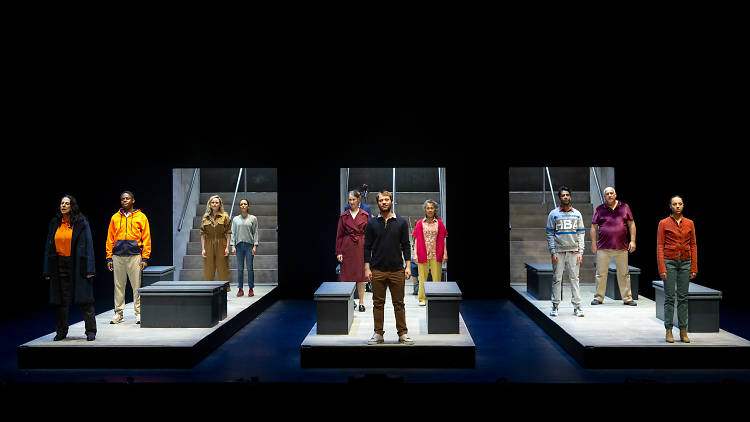A successor to 1999’s Who’s Afraid of the Working Class?, Anthem reunites the same composer and quartet of playwrights to present another realist snapshot of the nation. It’s mainly set on Melbourne’s overcrowded trains, where people of different classes, genders, races and sexual orientations literally come face to face and “bum to groin” in this work’s irreverent language. It boldly tackles Australian society’s fragmentation and has several powerful moments, but these four perspective-packed interweaving plays sometimes lack cohesion.
 Anthem. Photograph © Pia Johnson
Anthem. Photograph © Pia Johnson
The struggle to make ends meet is the main thread running through Anthem. Created by Christos Tsiolkas, Patricia Cornelius, Melissa Reeves and Andrew Bovell, and played by a talented, multi-tasking cast of 12, perhaps twice that many diverse characters reveal this struggle from various perspectives. The diversity is most apparent, if unlikely, in four half-siblings with different fathers: Anglo, Arab, Indigenous and sub-Saharan African. One of them is gay, and returning to Australia after escaping his family’s “bogan” recipe for failure: outer-suburban poverty and lack of education. His return provides Anthem’s prologue, placing what follows – including his three siblings’ aggressive encroachment into other train passengers’ personal space – within an international and intellectual context of economic struggle.
Stand-out scenarios are a woman who has fallen on hard times (Maude Davey) unexpectedly meeting her former cleaner (Amanda Ma), leading to recriminations about money and domestic violence; the darkly humorous Bonnie and Clyde wannabes (Eryn Jean Norvill and Sahil Saluja) who set out to take revenge on the one percent for wage theft; the isolated, enigmatic Indigenous busker (Ruci Kaisila, showing off a pure, powerful voice) reduced to cries of “pay up” when no one responds to her songs – which are ironically Australian; and the exchange between a young woman (Eva Seymour) and a ticket inspector of Middle Eastern origin (Osamah Sami). She is portrayed as a bad mother and racist, but we soon feel sympathy for her desperate circumstances, as well as the sad, disappointed man behind the inspector’s uniform. This short, searing scenario is when Anthem really hits its mark.
Irine Vela’s solemn and evocative original score is performed by Jenny M. Thomas (violin) and Dan Witton (double bass) live on stage, unobtrusively mingling with the actors. While the brother’s return to Australia is played out at start and end in an otherwise concealed mezzanine stage, most of the action takes place on a set that evokes train travel with clever simplicity. Three steep stairwells upstage lead down to numerous bench seats, which are quickly reconfigured by the cast as one scene weaves into the next.
Marg Horwell’s minimalist set is a relief given the play’s parade of characters, scenarios and perspectives, which director Susie Dee admirably holds together most of the time. Anthem strongly conveys the sense that Australians (urban ones at least) are economically stressed and so ideologically divided that no one anthem applies to any of them. However, much as it is thought-provoking, enlightening and at times moving, this new work sometimes sags under the weight of its diverse ideas.
Anthem is at the Playhouse, Arts Centre Melbourne, until October 6











Comments
Log in to join the conversation.